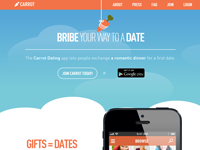Dating App Carrot lets you Bribe your way to a Date
- Sunday, December 08 2013 @ 10:02 am
- Contributed by: kellyseal
- Views: 1,456

Would you consider bribing someone to go out with you, say with a nice dinner or skydiving trip? According to Brandon Wade, an MIT graduate and founder of a new matchmaking app called Carrot Dating, most men would.
The idea behind the app (and its name) is that users can "dangle a carrot" in exchange for getting women to go out with them. (In fairness, the site claims that both men and women can accept or offer gifts in exchange for a date.)
Users can accept gifts or activities for a first date, from something as expensive as plastic surgery or as minimal as a tank of gas.
Most of the reviews for the new service have been skeptical, if not downright hostile regarding the purpose of the app.
Business Insider's Christina Sterbenz wrote in a scathing review, "through Carrot Dating, users (but really men)... can buy credits to send "gifts" to other users ... so they'll agree to a first date. That sounds quite like an activity illegal in most of the continental US - prostitution." She goes on to say that, "in fact, this problematic app is teaching men that women are greedy idiots who can't see through blatant and pathetic misogyny."
Wade has a different opinion however, especially when it comes to online dating. He maintains that women constantly get messaged while men struggle to get even one response. This is a way to level the playing field, to ensure that men get what they desire, too, instead of just messaging and hoping.
"Online dating is a superficial game," the Carrot Dating site claims. "With Carrot Dating, you won't get rejected before you even get a chance. Convince singles that spending time with you is worth it by making an offer that they simply cannot refuse."
But does this approach work in the real world, especially if you're looking for a real relationship and not just a pretty date?
Not likely. Some experts have chimed in too, noting that when you're buying presents in order to secure a first date, then she probably won't continue to date you unless you keep buying her gifts. There is no motivation to really get to know each other as you would on a traditional date without such bribes.
This app plays into the insecurities of men, especially when it comes to online dating. Unfortunately, it's not an app that can ultimately help them obtain a relationship. That takes work, not gifts. And it probably takes a few more messages and a more open mind.

